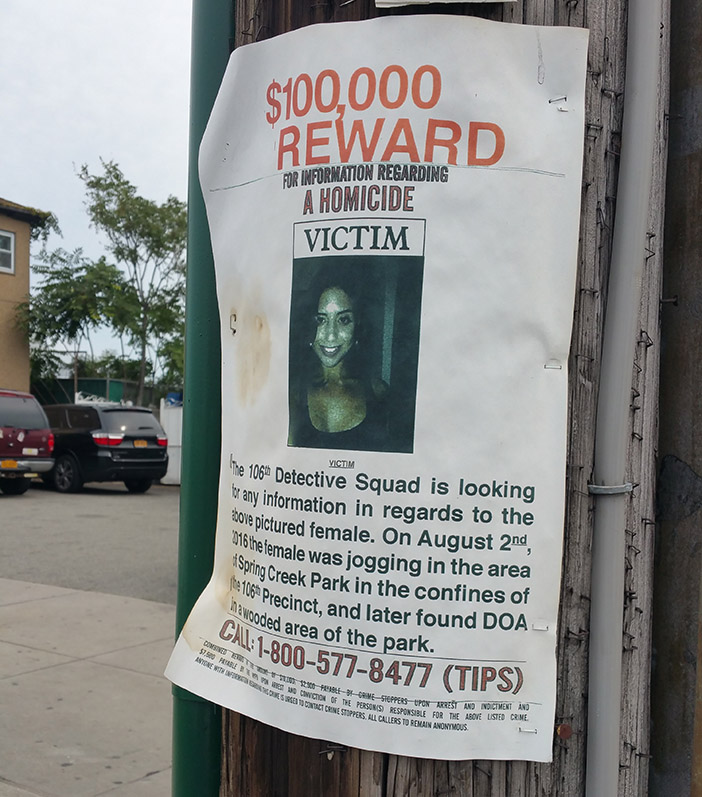Forum Photo by Michael V. Cusenza
Queens DA Richard Brown has said that familial DNA searches can help cops nab Karina Vetrano’s killer.
By Michael V. Cusenza
Queens District Attorney Richard Brown this week joined the family of slain Howard Beach jogger Karina Vetrano in asking the state to quickly authorize familial searching of New York’s DNA databases to help investigators develop a suspect in the cold case.
“This effective technique, currently authorized in 11 U.S. states – and in the United Kingdom, which pioneered its use – has already produced DNA leads that ultimately broke cold-case murders, rapes and other crimes,” Brown noted. “And by reliably generating leads that can allow law enforcement to identify the guilty, the technique helps to ensure that the innocent will not be wrongly charged.”
According to the National Institute of Justice Forensic Technology Center of Excellence, familial DNA searching is a two-phase process which attempts to provide investigative leads by identifying an individual in existing DNA databases who is highly likely to be a close relative of the donor of the DNA profile derived from the evidence found at the crime scene.
Karina Vetrano, 30, was beaten, strangled, and sexually assaulted in the evening hours of Aug. 2 on her daily run inside Spring Creek Park. DNA collected at the scene and from Vetrano’s body yielded no hits in any law-enforcement database.
Brown called fears about familial DNA searching “misguided.”
“Familial matches cannot result in wrongful convictions,” Brown added. “On the contrary, familial searching is designed to narrow down the search, produce leads in cold cases and exclude those who are not likely to be the perpetrator – thus targeting the potentially guilty while safeguarding the innocent. Critics of the technique like to point to the experience of the New Orleans filmmaker whose DNA came up as a possible familial match in a murder investigation. But that example does not support the wrongful-conviction argument – he was in fact ruled out as a suspect upon testing of his own DNA sample. In other words, forensic DNA prevented him from being wrongly prosecuted.”
Brown later added that the forensic technique “is no more invasive of citizens’ privacy than standard criminal investigative techniques that have long been employed without controversy. For example, fingerprinting has been used in the United States for over a century and computerized fingerprint databanks have existed for over 40 years. When a fingerprint is recovered at a crime scene, the police run it through the statewide fingerprint databank, which returns a group of possible matches. The police do not begin by arresting those people whose fingerprints are near-matches. They investigate further to narrow the field to a match. And unlike the DNA databank, the fingerprint databank is not limited to convicted criminals. It is much broader, encompassing even government employees and others whose employment requires a background check and who have never been arrested, let alone convicted, of a crime. The DNA databank, on the other hand, contains DNA samples only from convicted criminals – not law-abiding members of the public.”
A cousin of Karina Vetrano, Maria Wurpel, has set up a petition on change.org titled “Familial DNA Testing for Identifying Killer in New York Murder/Rape Cases.” As of Wednesday evening, it featured more than 10,100 signatures.
“Supporting this petition could potentially allow this method to be used in cases such as Karina’s to assist in identifying potential suspects when a match cannot be attained through traditional DNA testing,” Wurpel wrote. “I urge you to support this petition to allow Karina’s assailant to potentially be identified and brought to justice. Allowing this test to be approved in NY will not only identify Karina’s murderer but other unsolved murders in NY.”
Brown cited the California Roaming Rapist, who had attacked 10 victims over the course of 14 years, as a case-in-point for familial searching.
“He was identified through a familial DNA search that turned up his brother, a convicted rapist whose DNA was in the state database. Using that lead, the police were able to identify his brother as the serial rapist before he could strike again,” Brown noted. “The so-called “Grim Sleeper” serial killer of Los Angeles was similarly identified through his son’s DNA. Just days ago, familial searching in Ohio resulted in the arrest of a man charged with multiple crimes including child abduction and child sexual assault. These cases compellingly demonstrate the efficacy and importance of familial DNA searching.”
Brown said he hopes the Commission acts fast.
“Without prompt action, killers, rapists and those who commit other serious crimes will continue to remain at large, the public will remain in danger and the suffering of victims’ families will be amplified by the inability to solve these crimes,” he noted. “We seek not just to apprehend the individual who viciously raped and murdered Karina Vetrano – although that would be reason enough – but also to prevent that predator from striking again. How would we explain to another parent that we had the means to prevent their loss but lacked the will? Justice demands that law enforcement be able to use every lawful means at its disposal to identify the perpetrators. We owe the public nothing less.”

